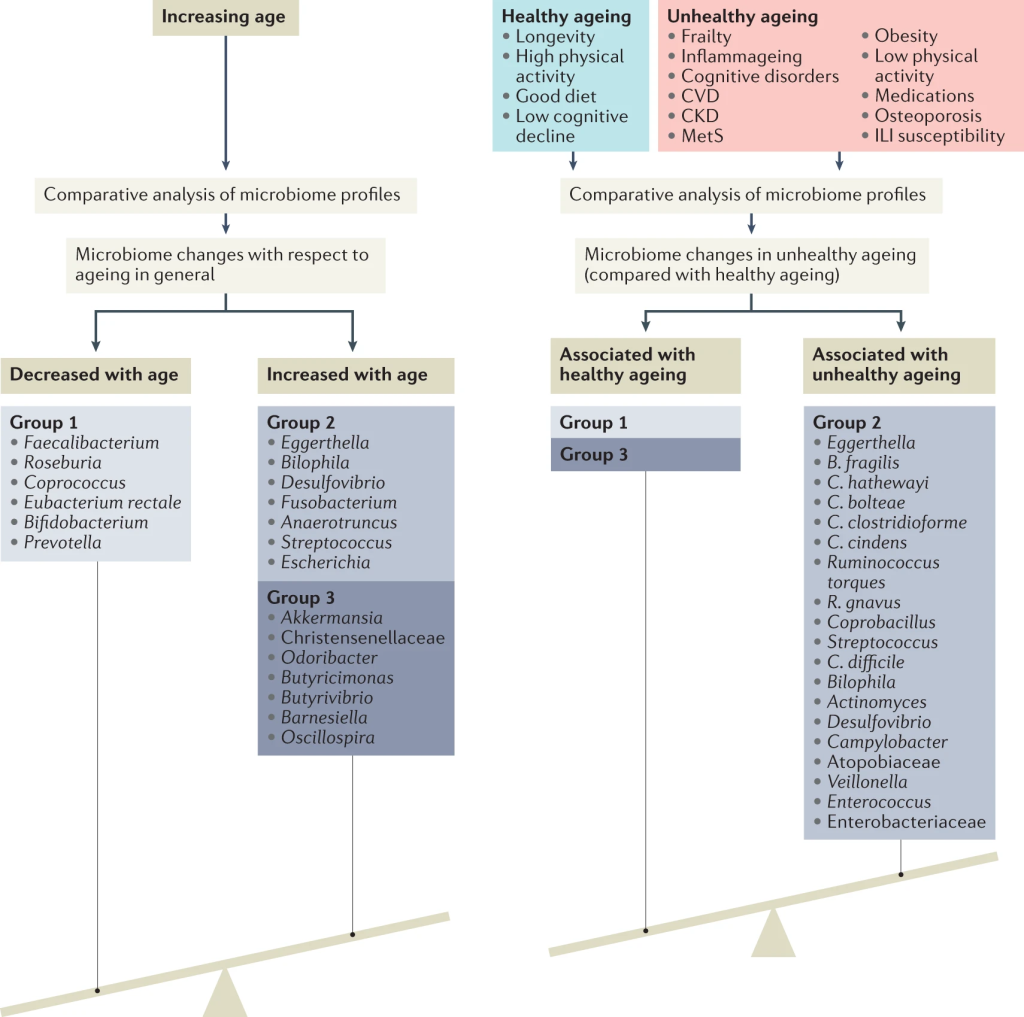Some people may ask “Does anyone know the list of gut microbes does ameliorate aging?” looking for a magazine of magical bullets to reverse aging. Unfortunately, there are far more bacteria then will fit into a magazine.
From Literature we can see the main genus involved. Remember every genus has many species. Every species have many strains.

- “The identified microbiome pattern of healthy ageing is characterized by a depletion of core genera found across most humans, primarily Bacteroides. Retaining a high Bacteroides dominance into older age, or having a low gut microbiome uniqueness measure, predicts decreased survival in a 4-year follow-up.” Gut microbiome pattern reflects healthy ageing and predicts survival in humans[2021]
This data has been added to Medical Conditions with Microbiome Shifts from US National Library of Medicine. With the following generic suggestions, which is also available to be tuned to your specific uploaded microbiome.

While we have over 4000 samples, most of the samples are from people dealing with health issues. The average number of matches for each age group (when given) is shown below. If your own values is significantly above the number under Matches, you should have some concerns. We do see the number increases around 70.
| Lab | Age Range | Matches |
| OmbreLab | Age: 30-40 | 5.1 |
| OmbreLab | Age: 40-50 | 4.8 |
| OmbreLab | Age: 50-60 | 4.7 |
| OmbreLab | Age: 60-70 | 5.2 |
| OmbreLab | Age: 70-80 | 6.7 |
| BiomeSight | Age: 30-40 | 4.8 |
| BiomeSight | Age: 40-50 | 4.5 |
| BiomeSight | Age: 50-60 | 4.6 |
| BiomeSight | Age: 60-70 | 4.2 |
| BiomeSight | Age: 70-80 | 3.9 |
| BiomeSight | Age: 80-90 | 7 |
I am 70, and decided to look at the last few years of samples. I noticed a blimp with a relapse of ME/CFS which slowly declined with remission.
| Sample Date | Matches | Comment |
| October 20, 2019 | 5 | |
| December 6, 2019 | 7 | ME/CFS Relapse |
| December 13, 2019 | 7 | |
| February 23, 2020 | 5 | |
| October 29, 2020 | 6 | |
| July 27, 2021 | 6 | |
| September 9, 2021 | 4 | |
| January 24, 2022 | 4 | |
| May 23, 2022 | 4 | |
| September 18, 2022 | 5 | |
| December 1, 2022 | 5 |
Using BiomeSight processing (which allows my earlier ubiome data to be added). We see the unhealthy spike with ME/CFS
| Sample Date | Matches | |
| November 6, 2017 | 3 | |
| March 16, 2018 | 5 | Work Stress |
| March 19, 2019 | 7 | ME/CFS Flare |
| April 9, 2019 | 7 | |
| February 23, 2020 | 5 | |
| November 17, 2020 | 4 | |
| September 9, 2021 | 6 | |
| January 24, 2022 | 4 |
REMEMBER: Quality of processing of samples can vary greatly. The above should be taken with 0.1 grams of NaCl.
Example of Getting Suggestions
I used Microbiome Prescription site to identify these 4/5 and get suggestions. First, note that different labs detect things differently (See The taxonomy nightmare before Christmas…). The bacteria selections done below are based on the percentile ranking (> 75%ile or < 25%ile) of other lab results from the same lab.




What we see is that 5+4 = 8 bacteria of concern — only Enterobacteriaceae was shared between labs.
I then went over to Multiple Samples Tab and looked at the multiple sample Consensus

With the results shown below

The last two are interesting, with the consequence being a shift from chicken to using beef (and with likely smaller portions).
Bottom Line
As shown above, I would recommend getting your FASTQ files processed by both OmbreLab and BiomeSight … a continuing part of The taxonomy nightmare before Christmas… Then do both through this system and getting a Consensus report across samples.
Why does the prescription site state that lactulose increases bacteroides when many studies and even Jason Hawrelak state lactulose is a product that very quickly decreases bacteroides.
The sources of the data (Studies on PubMed) are provided on the site. Different studies can produces opposite results.
If there are studies (on PUBMED) that I missed or misinterpreted — please put the links in an email and send them to me.
The study must be on PubMed and not some blogger opinion.